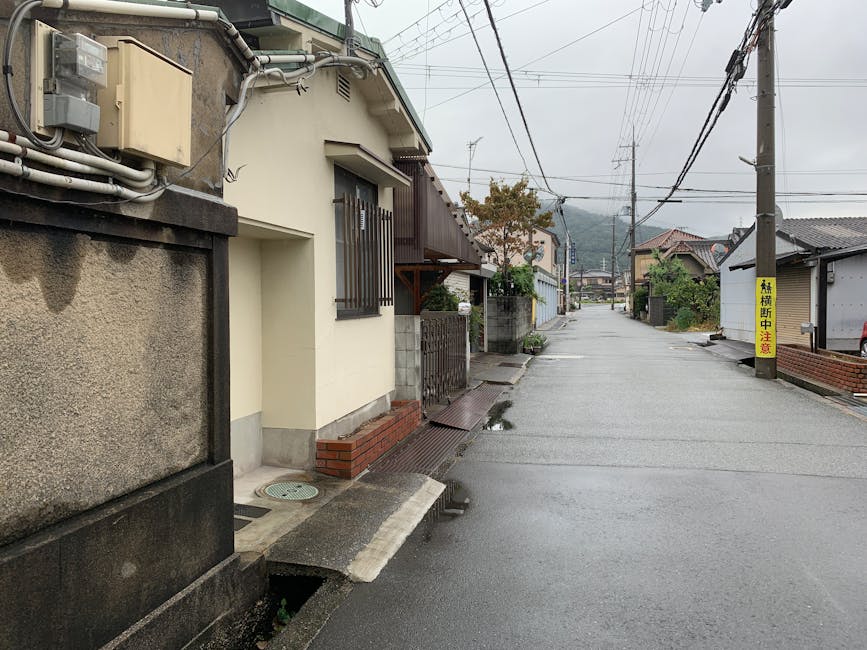Living in Japan Sucks? Unveiling the Quirks and Challenges of Life in the Land of the Rising Sun 🇯🇵

Living in Japan Sucks? Unveiling the Quirks and Challenges of Life in the Land of the Rising Sun 🇯🇵
Let's be honest, the internet loves a good contrarian take. And "Living in Japan Sucks" definitely grabs your attention, doesn't it? Now, before you pack your bags and delete your Japanese language learning apps, let's unpack this statement a little. I'm not going to tell you Japan is a perfect paradise. It's not. It has its quirks, its frustrations, and its unique challenges. But labeling it as simply "sucky" is, well, a bit of an oversimplification.
As a long-time admirer, and occasional resident, of Japan, I see it as a fascinating, complex tapestry woven with threads of breathtaking beauty and subtle annoyances. Think of it like that perfectly crafted minimalist tea set you adore: beautiful to look at and a joy to use, but a pain to clean if you let the tea stains linger too long.
So, let's dive into some of the aspects of life in Japan that might lead someone to use such strong words, and then, more importantly, let's look at how to navigate them, embrace them, or at least understand them better. Because, ultimately, whether or not you find living in Japan "sucky" is highly subjective and depends on your own expectations, personality, and ability to adapt.
The Language Barrier: More Than Just Words

This is the big one, the elephant in the room, the tatemae (official stance) versus the honne (true feelings) of everyday interaction. The language barrier in Japan can be a real struggle, especially if you venture outside of major cities. While English signage is improving in tourist areas, day-to-day life requires at least a basic understanding of Japanese.
But it's not just about vocabulary and grammar. It's about understanding the nuances of Japanese communication, the subtle cues, the unspoken rules. It's about deciphering the politeness levels, the honorifics, and the contextual meaning behind what people say (or don't say!).
Here are some potential pitfalls:
- Bureaucracy: Dealing with paperwork, government offices, or even setting up utilities can feel like navigating a complex maze if you don't speak the language fluently. Expect lots of forms, stamps (hanko), and potentially long waiting times.
- Healthcare: Explaining your medical issues or understanding diagnoses can be stressful and challenging without adequate language skills. It's always a good idea to find a doctor who speaks your language or to bring a translator.
- Social Interactions: While many Japanese people are friendly and welcoming, striking up conversations and building deeper relationships can be difficult if you can't communicate effectively. This can lead to feelings of isolation and loneliness.
The Solution:
Embrace the challenge! Invest in language learning, even if it's just the basics. Apps like Duolingo and Memrise are a great starting point. Consider taking formal Japanese classes or hiring a tutor. Don't be afraid to make mistakes – Japanese people generally appreciate the effort you're making to learn their language.
And remember, a smile and a little bit of Japanese politeness can go a long way. Even if you can only say "Konnichiwa" (hello) and "Arigato gozaimasu" (thank you), it shows respect and willingness to engage.
The Pressure to Conform: Standing Out Can Be… Challenging

Japanese society places a strong emphasis on harmony and group cohesion. This can translate to a pressure to conform, to fit in, and to avoid standing out too much. While this emphasis on order and politeness contributes to the overall safety and cleanliness of Japan, it can also feel stifling to those who value individuality and self-expression.
Think of it like this: imagine a perfectly manicured Zen garden. Every rock is carefully placed, every grain of sand meticulously raked. While beautiful, it doesn't exactly encourage spontaneous bursts of creativity or unconventional displays of personality.
Here's how this pressure can manifest:
- Dress Code: While not always explicitly stated, there's often an unspoken dress code in many workplaces and social settings. Think neat, conservative, and avoiding anything too flashy or attention-grabbing.
- Behavioral Norms: There are certain behavioral norms that are expected to be followed, such as avoiding loud talking on public transportation, not blowing your nose in public, and always being punctual.
- Directness vs. Indirectness: Japanese communication is often indirect and subtle, relying on context and nonverbal cues. Directness can be seen as rude or confrontational.
The Solution:
Find a balance between respecting cultural norms and expressing your individuality. Observe and learn from the people around you, and try to understand the underlying reasons behind these norms. While you don't have to completely abandon your own style or personality, being mindful of Japanese customs and etiquette will help you integrate more smoothly into society.
And remember, there are plenty of spaces in Japan where individuality is celebrated! Explore niche communities, art scenes, and subcultures where you can freely express yourself and connect with like-minded individuals.
The Salaryman Grind: Work-Life Balance? What's That?

The stereotype of the overworked and underpaid Japanese salaryman is, unfortunately, often rooted in reality. While things are slowly changing, long working hours, limited vacation time, and a strong emphasis on company loyalty are still prevalent in many Japanese workplaces.
Imagine a beautifully designed office space, filled with ergonomic chairs and state-of-the-art technology. But those chairs are occupied for 12+ hours a day, and that technology is used to meet relentless deadlines, often at the expense of personal well-being.
Here's what to expect:
- Long Working Hours: It's not uncommon for Japanese employees to work long hours, often exceeding 40 hours per week. Overtime is often expected, and taking vacation time can sometimes be frowned upon.
- Company Loyalty: There's a strong emphasis on loyalty to the company, and employees are often expected to prioritize their work over their personal lives.
- Power Harassment (Pawahara) and Sexual Harassment (Sekuhara): While awareness is growing, workplace harassment can still be a problem in some companies.
The Solution:
Research potential employers thoroughly before accepting a job offer. Ask about work-life balance policies, overtime expectations, and company culture. If possible, talk to current or former employees to get a sense of what the work environment is really like.
Set boundaries and prioritize your own well-being. Don't be afraid to say no to extra work if you're feeling overwhelmed, and make sure to take your vacation time. Remember, your health and happiness are just as important as your job.
Consider alternative career paths that offer more flexibility and work-life balance. Freelancing, remote work, and starting your own business are all viable options in Japan.
The Housing Situation: Cozy Can Be Cramped

Space is at a premium in Japan, especially in major cities. This means that apartments and houses can be quite small, often smaller than what you might be used to in other countries. While Japanese design often maximizes the use of limited space, it can still feel cramped and claustrophobic, especially if you're used to having a lot of room to spread out.
Think of it like a meticulously crafted bento box: every morsel of food is carefully arranged and perfectly proportioned. While aesthetically pleasing and functional, it's not exactly designed for sharing or for accommodating large appetites.
Here's what to expect:
- Small Apartments: Expect small apartments with limited storage space. You may need to get creative with your furniture and belongings to make the most of the available space.
- Expensive Rent: Rent can be quite expensive, especially in popular areas of major cities. Be prepared to pay a significant portion of your income towards housing costs.
- Unique Housing Customs: There are some unique housing customs in Japan, such as the use of tatami mats, sliding doors (shoji), and futon beds.
The Solution:
Embrace minimalist living! Get rid of anything you don't need or use, and focus on owning only essential items. Invest in multi-functional furniture and storage solutions that maximize space.
Consider living in a less expensive area, even if it means commuting a bit further to work or school. Explore different types of housing options, such as share houses or apartments in older buildings.
And appreciate the beauty and functionality of Japanese design. Learn how to live comfortably and efficiently in a small space.
The Food: Delicious, But Not Always Accessible (or Affordable)

Japanese cuisine is undoubtedly one of the highlights of living in Japan. From sushi and ramen to tempura and okonomiyaki, there's a dish to suit every taste. However, accessing certain types of food, especially if you have dietary restrictions or allergies, can be challenging.
Think of it like a perfectly curated tasting menu at a high-end restaurant. Every dish is a work of art, but it might not cater to everyone's preferences or dietary needs.
Here's what to expect:
- Dietary Restrictions: Finding vegetarian, vegan, or gluten-free options can be difficult in some restaurants. It's important to learn how to communicate your dietary needs clearly in Japanese.
- Allergies: Cross-contamination can be a concern for people with severe allergies. Be extra cautious when eating out and make sure to ask about ingredients and preparation methods.
- Affordability: While you can find cheap eats in Japan, dining out regularly can be expensive, especially at high-end restaurants.
The Solution:
Learn how to cook Japanese food at home! There are plenty of online resources and cookbooks available to help you get started. This is a great way to control the ingredients and ensure that your meals meet your dietary needs.
Explore different types of restaurants and food stalls. Look for smaller, local establishments that offer more affordable options.
And don't be afraid to ask questions! Most Japanese people are happy to help you find something you can eat.
So, Does Living in Japan Suck?

Ultimately, the answer is… it depends. Japan is not a perfect place, and it certainly has its challenges. But it's also a fascinating, beautiful, and culturally rich country that offers a unique and rewarding experience for those who are willing to embrace its quirks and adapt to its customs.
If you're expecting a Western-style lifestyle in Japan, you're likely to be disappointed. But if you're open to new experiences, willing to learn, and prepared to step outside of your comfort zone, you might just find that living in Japan is one of the most enriching and rewarding experiences of your life. It's not always easy, but it's definitely worth it for those who appreciate the beauty, the culture, and the unique way of life that Japan has to offer.
Think of it as a beautiful, intricately crafted piece of art. It may have its imperfections, its flaws, and its quirks, but those are also the things that make it unique and special. And ultimately, whether or not you appreciate it depends on your own perspective and your willingness to see its beauty.
And who knows, maybe you'll even find yourself embracing the "suckiness" and finding beauty in the unexpected challenges of life in Japan. Because sometimes, the most rewarding experiences are the ones that push us outside of our comfort zones and force us to grow.
Post a Comment